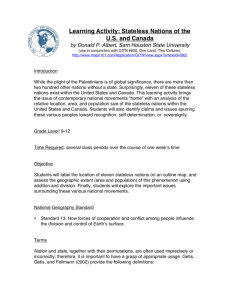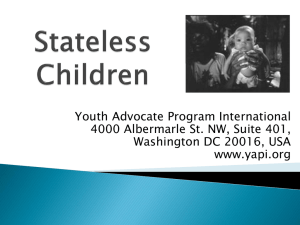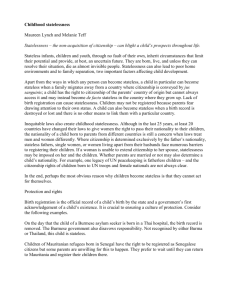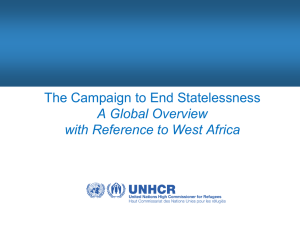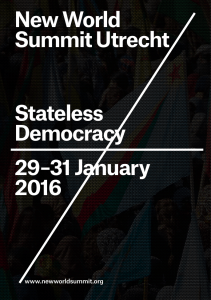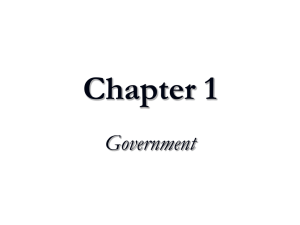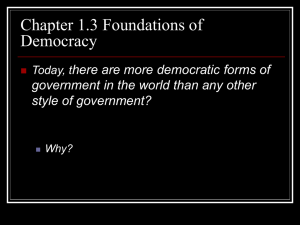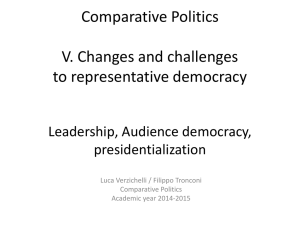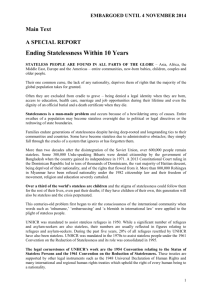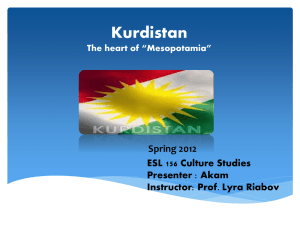NEW WORLD SUMMIT_programme_site
advertisement
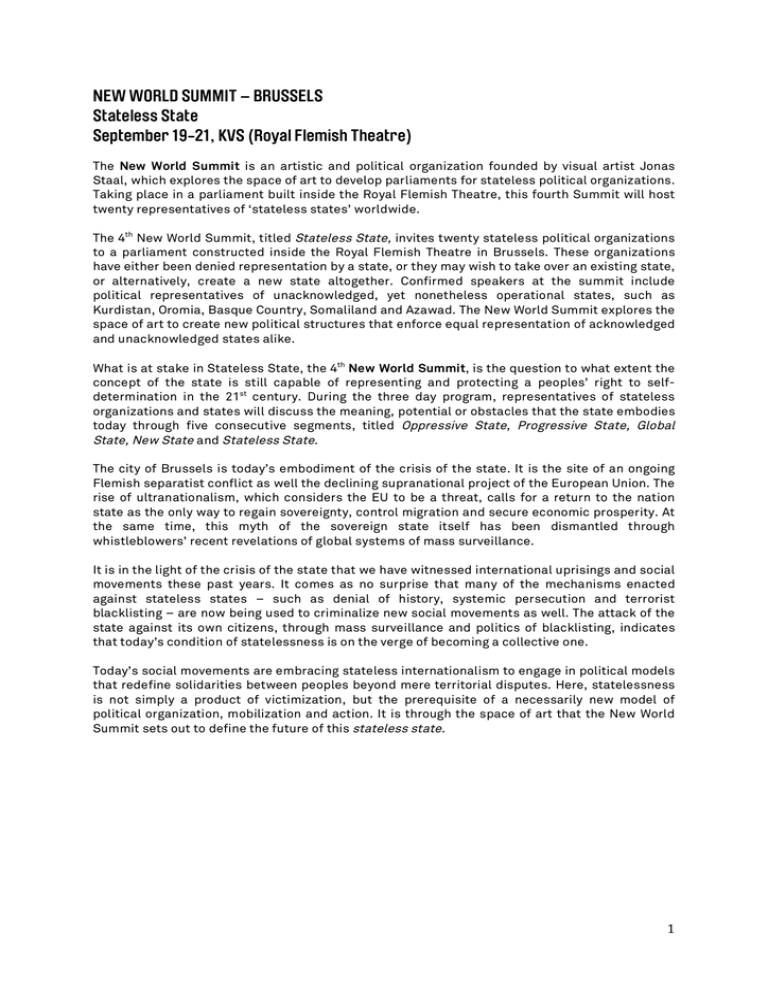
NEW WORLD SUMMIT – BRUSSELS Stateless State September 19-21, KVS (Royal Flemish Theatre) The New World Summit is an artistic and political organization founded by visual artist Jonas Staal, which explores the space of art to develop parliaments for stateless political organizations. Taking place in a parliament built inside the Royal Flemish Theatre, this fourth Summit will host twenty representatives of ‘stateless states’ worldwide. The 4th New World Summit, titled Stateless State, invites twenty stateless political organizations to a parliament constructed inside the Royal Flemish Theatre in Brussels. These organizations have either been denied representation by a state, or they may wish to take over an existing state, or alternatively, create a new state altogether. Confirmed speakers at the summit include political representatives of unacknowledged, yet nonetheless operational states, such as Kurdistan, Oromia, Basque Country, Somaliland and Azawad. The New World Summit explores the space of art to create new political structures that enforce equal representation of acknowledged and unacknowledged states alike. What is at stake in Stateless State, the 4th New World Summit, is the question to what extent the concept of the state is still capable of representing and protecting a peoples’ right to selfdetermination in the 21st century. During the three day program, representatives of stateless organizations and states will discuss the meaning, potential or obstacles that the state embodies today through five consecutive segments, titled Oppressive State, Progressive State, Global State, New State and Stateless State. The city of Brussels is today’s embodiment of the crisis of the state. It is the site of an ongoing Flemish separatist conflict as well the declining supranational project of the European Union. The rise of ultranationalism, which considers the EU to be a threat, calls for a return to the nation state as the only way to regain sovereignty, control migration and secure economic prosperity. At the same time, this myth of the sovereign state itself has been dismantled through whistleblowers’ recent revelations of global systems of mass surveillance. It is in the light of the crisis of the state that we have witnessed international uprisings and social movements these past years. It comes as no surprise that many of the mechanisms enacted against stateless states – such as denial of history, systemic persecution and terrorist blacklisting – are now being used to criminalize new social movements as well. The attack of the state against its own citizens, through mass surveillance and politics of blacklisting, indicates that today’s condition of statelessness is on the verge of becoming a collective one. Today’s social movements are embracing stateless internationalism to engage in political models that redefine solidarities between peoples beyond mere territorial disputes. Here, statelessness is not simply a product of victimization, but the prerequisite of a necessarily new model of political organization, mobilization and action. It is through the space of art that the New World Summit sets out to define the future of this stateless state. 1 I. OPPRESSIVE STATE Friday 19 September, 19:00 – 22:00 Chaired by Jan Goossens (KVS) The section Oppressive State explores the state as an oppressive construct that relies on processes of exclusion. The discussion revolves around states that enforce the idea of the nation as a community of a homogeneous people with a shared language and history, while actively repressing the cultural presence of peoples that could contest this imagined unity. The Framing of the Uyghur Independence Movement: China’s War on Terror World Uyghur Congress (WUC) - Rebiya Kadeer This lecture will address the Chinese government’s strategic appropriation of the US rhetoric of the War on Terror, claiming the Uyghur as the “equivalent” of Al-Qaeda. This rhetoric functions as a cover-up of the ongoing occupation of Uyghur territory and the persecution of its citizens. Paradoxically, the US intervened when Rebiya Kadeer was sentenced to death by the Chinese state, for leaking information about separatist insurgencies. The Bush administration has vocally supported her case, yet it has also imprisoned a total of 22 Uyghurs in Guantanamo Bay since 2002. What is the future of Uyghur independence trapped in a war on terror, whose authors have become the rescuers from the violence they themselves have sanctioned? A Criminal State: The Blacklisting of the Oromo Liberation Struggle for Freedom and Democracy Oromo Liberation Front (OLF) - Shigut Geleta This lecture will address the manner in which blacklisting a separatist political movement as ‘terrorist’ functions as an ideological cover-up of the enforced administrative construct of the Ethiopian state. Apart from the Oromo, who represent the largest ethnic group in the country, many other peoples struggle for independence from the contested state. At what level can we argue that the state of Ethiopia even exists, when its main legitimacy seems to be based on its capacity to suppress the very political majorities that constitute it? The blacklisting of a people’s history thus becomes a way of evading confrontation with the criminal dimensions of the state itself. A People Negated within the State Ahwazi-Arab Alliance / Democratic Solidarity Party of Ahwaz (DSPA) - Karim Adbian This lecture will address the manner in which the Iranian state denies the existence of the Ahwazi-Arab nation. Since the minority occupation of 1925, central governments have pursued a policy to strip indigenous Arabs of Al-Ahwaz of their Arab identity. Cultural expression such as the use of the Arabic language in education and claims for human rights, social and economic justices are often labeled as a ‘danger to territorial integrity’. By enforcing an idea of Iran as a homogeneous Persian Shiite nation-state, a people are being negated within the state. The Ahwazi Arabs are thus actively erased from public memory and the economic and political present, which is what defines their resistance as a civil rights movement: a stateless people demanding recognition and the right to self-determination. However, the central government of Iran perceives any plight for self-determination of minorities as a separatist or terrorist act, negating the possibility of the existence of multiple nations within one state. The Formation of a Nation: Can the Children of a Colony be Indigenous? Baster People of Rehoboth - Martin Gustav Dentlinger This lecture will address the complex nature of peoples that have been shaped through the history of colonial occupation, such as the Baster People of Rehoboth. These children of colonists and indigenous people have suffered a history of exclusion, as they belonged neither to the colonizers nor to the indigenous. Nonetheless, the Baster People of Rehoboth will argue that being the product of colonial history is simply another form of indigeneity, which, just as any other peoples, allows for the right to self-governance and acknowledgment of a unique common culture, language and politics. 2 II. PROGRESSIVE STATE Saturday 20 September, 13:00 – 16:00 Chaired by Véronique Dudouet (Berghof Foundation) The section Progressive State explores to what extent the state can function as a crucial part of internationalist progressive struggles. If we define progress not in terms of acquiring wealth, but in obtaining the right to self-determination for individuals and their communities, at what level can the state contribute to that process of basic democratization? And how can concepts such as “people” and “nation” overcome their framing within ultranationalist, racist rhetoric? National Liberation versus Ultranationalism: The Universal Category of the Basque Euskal Herria Bildu [‘Basque Country Unite’] (EHB) - Josu Juaristi This lecture will address the difference between ultranationalism and the national liberation movement of the EH Bildu coalition. Although EH Bildu lays a clear territorial claim, it does not promote a Basque Country in purely ethnic terms. Rather, it regards the case of the Basque people as a universal condition of all peoples striving for the right to self-determination. Thus right-wing ultranationalism regards separation from others as a victory, while left-wing internationalism treats self-determination as just one of many steps towards articulating an internationalist commons. The progressive national state, in this context, is an internationalist one. The New Revolutionary Proletariat of the Philippines National Democratic Front of the Philippines (NDFP) & Makabayang Kilusan ng Bagong Kababaihan [‘Free Movement of New Women’] (MAKIBAKA) - Coni Ledesma This lecture will address the history of the Maoist oriented National Democratic Front in the Philippines, which has built a parallel state: a broad network of underground and above ground organizations, including many grass-roots Catholic organizations, youth councils, labor unions and the like. While the proletariat has all too often been reduced to the figure of the male worker, the Filipino social movement includes women, gay and transgender communities and fighters as absolute equals. As a progressive parallel state it offers a wide range of services the state is not able to provide, ranging from education and relief work after the recent hurricane Haiyan to divorce, and gay marriage. The NDFP is an early advocate of LGBTQ rights. Extraterritorial Activism: Abortion: From National Privilege to Universal Right Women on Waves (WoW) - Rebecca Gomperts This lecture will address the possibility of reforming states through extraterritorial activism. While Women on Waves sails under the Dutch flag in order to be able to perform abortions that are legal under Dutch law, it does not necessarily promote the Dutch state as such. Rather, it defends a specific emancipatory heritage of the Dutch women’s rights movement, in order to defend and shape its principle into a universal right instead of a national privilege. Starting from national pro-choice law, Women on Waves thus shapes an internationalist discourse of universalism by compounding the legal state with extraterritorial activism. 3 III. GLOBAL STATE Saturday 20 September, 17:00 – 20:00 Chaired by Jolle Demmers (Centre for Conflict Studies, Utrecht University) The section Global State explores the state in relation to globalization. On the one hand, it centers on stateless groups confronting crises caused by global capitalism, which are often unaccountable and uncontrollable by existing state structures. On the other hand, this segment engages with stateless groups that strive for the creation of global political structures in order to confront phenomena that pose a threat to the self-determination and survival of peoples on a global level. Speakers address globalization as a source of conflict, as well as a possible solution. Between National and Global Repression: Ecology, Self-Determination and Survival in Southern Azerbaijan Southern Azerbaijan Alliance - Ayda Karimli This lecture will address the friction between the demands for a right to self-determination within a state, and the confrontation of disasters whose conditions can only be addressed on a global scale. In other words, only when a political infrastructure is able to guarantee the survival of ecological formation and diversity, that specific, cultural, ethnic and indigenous struggles can gain strength and meaning. Conversely, it is also because of these specific struggles that we are able to see the consequences of global disaster at all. In this lecture, Ayda Karimli will address how, within the Southern Azerbaijan alliance, the dialectic between the struggle for self-determination and common survival takes shape. The Diasporic State: Parallel Politics of the Baluch Baluchistan People’s Party (BPP) - Nasser Boladai This lecture will address the Baluch people’s stateless state of being divided across different states, stretching from Iran to Pakistan and Afghanistan. Although the Baluch inhabit a territory with vast resources – West Baluchistan produces a startling forty percent of Iran’s energy – only five percent of its population has a gas connection. This demonstrates the deep discrepancy between the material conditions available for a people to gain autonomy, and the structural denial of access to these means. The lecture will examine how regional integration between federal nations of different states can help to build solidarity beyond the state. In addition, it will look into the extent to which a global network of parallel states is capable of addressing regional, national and global issues. A Global Occupation: From Kurdish Independence to Occupy Wall Street Kurdistan National Congress (KNK) - Adem Uzun The Kurdish people live across current Turkey, Iraq, Iran, and Syria as a stateless people. This lecture will address the history of the Kurdish conflict not only as a conflict for an autonomous state, but rather as a struggle to redefine the concept of democracy in relation to the state as such. Although the origins of the Kurdish struggle lie in establishing an independent state, Öcalan has always differentiated between the concept of the ‘nation’ and that of the ‘state’. Accordingly, he has proposed the model of confederations within a nation, in order to overcome the process in which a radically differentiated people are forced to identify with a uniform nation state. These principles have resonated throughout the modern global democratization movements. Is it possible that in the global Occupy movement, which took over squares throughout the world as structures of cells in a grass root democracy, form the heirs of the process of liberating democracy from the state, as Öcalan and the Kurdish Movement proposed? 4 IV. NEW STATE Sunday 21 September, 13:00 – 16:00 Chaired by Maria Hlavajova (BAK, base for contemporary art, Utrecht) The section New State explores recent histories of newly formed states. The central question is: what defines a state? What elements are crucial in the composition of a state, in terms of police forces, military, economy, administration, legislative system, elections,..? To what extent can a state function without international and diplomatic recognition? A Constitution without Independence: The Blacklisted State of West-Papua The National Government of the Republic of West-Papua (NGRWP) - Simon P. Sapioper This lecture will address the process through which the constitution of West-Papua came into being, as a document that was consulted and supported by the people. This document stands in stark contrast to the 1969 ‘Act of Free Choice’ referendum, in which a small group of handpicked tribal leaders were forced to vote against independence. As a consequence, the UN blindly passed a resolution endorsing the continued Indonesian occupation. While West-Papua has all the elements in place to function as a state, its daily operations are systematically obstructed, not in the least because the Indonesian state went as far as to blacklist the government of West-Papua. Independence without Recognition: History of the De-facto Republic of Somaliland The Government the Republic of Somaliland - Mohamoud A. Daar This lecture will address the national and international functioning of the Republic of Somaliland both, which is not recognized by any other state in the world, but exists in de-facto independence. Whereas the Republic of Somaliland can control its own territory and historiography, it nonetheless does not exist as a “state” in the geopolitical realm. What lies at the basis of exclusion from international recognition, and what are the consequences for the introduction of one’s own currency, passports et cetera? Can a state exist and not exist at the very same time? Revolution without Frontiers: The Nomadic State of Azawad National Liberation Movement of Azawad (MNLA) - Moussa Ag Assarid This lecture will address the foundation of the Republic of Azawad and its ambitions to become a multiethnic and multi-religious secular state. The independence movement that declared Azawad was led by a coalition of Tuareg, Songhai, Fula and Arabs, many of which are nomadic peoples that belong to different territories that had been divided by the former colonies. In what ways do these nomadic peoples relate to the enforced concept of the state? And can the notion of a multi-ethnic and multi-religious state form its effective counter proposition, in the form of a nomadic state? 5 V. STATELESS STATE Sunday 21 September, 17:00 -20:00 Chaired by Jan Fermon (Progress Lawyers Network) The section Stateless State explores the concept of statelessness. Whereas the general preconception is that democracy is a product of the state, this discussion will revolve around forms of organizations that have proven themselves to operate outside the traditional conception of the state, in an attempt to overcome the reduction of a people in terms of territoriality or ethnicity. Speakers in this segment address the possibility of a stateless state, of practices that can genuinely be called democratic because they have been ‘liberated from the state’ all together. Democracy beyond the State: Wikileaks, the Pirate Party and the Icelandic Modern Media Initiative Pirate Party Iceland & International Modern Media Institute - Birgitta Jónsdóttir This lecture will address the role of the digital democratization movement in developing post-statist models of democracy. The so-called Pirate Parties deliberately engage with the idea of the “pirate” as nomad: as an extraterritorial entity, for whom property and culture exist in a state of movement and permanent sharing. Jónsdóttir will discuss how the project of democracy and stateless internationalism took on new forms through the digital revolution in the 21 st century. Stateless Democracy: How the Kurdish Women Movement Liberated Democracy from the State Kurdish Women's Movement, Komalên Jinên Kurdistan [Kurdistan Communities of Women] (KJK) - Dilar Dirik This lecture will address the role of the Kurdish Women’s Movement in emancipating the project of national liberation within Kurdistan. Dirik will specifically address how the Kurdish Women’s Movement opposes the violence of states, but also that of male patriarchal domination. Understanding the overarching systematic oppression of society as perpetuated by the capitalist, nation-state-oriented, dominant world order, has brought the Kurdish Women’s Movement in opposition of the concept of the state. Here, the state is seen as a replication of patriarchal relations, which they believe can only be undermined through principled gender equality in radical democratic confederalism beyond power, nationalism and the state. 6
